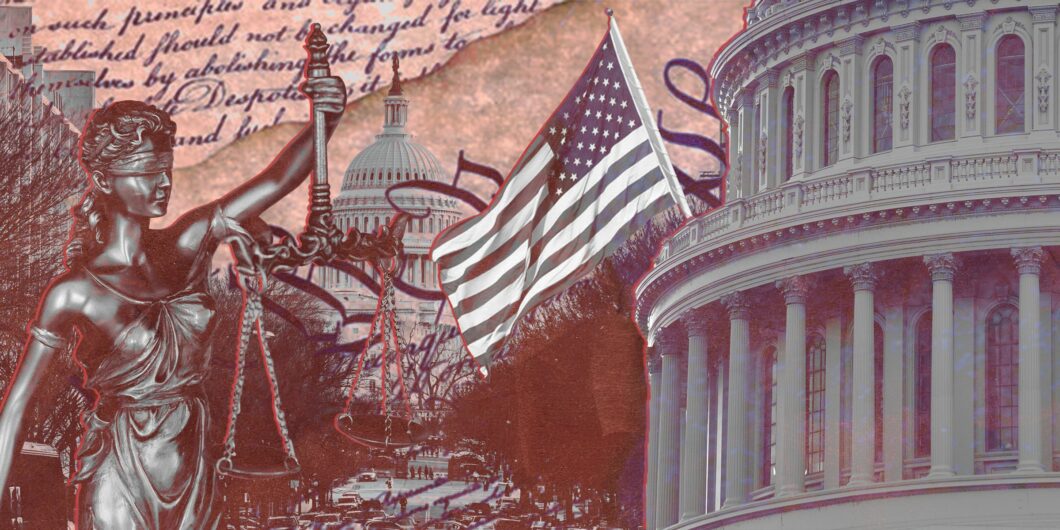Unity in Our Liberties
Yuval Levin’s “Constituting Unity” calls for Americans to reinvigorate their political institutions through a renewed understanding of the Constitution’s vision for us to “act together when we don’t think alike.” While I agree with many of his diagnoses and prescriptions, I am somewhat skeptical of his claims about our existing unity and his suggestions for how to strengthen that unity. In this commentary, I will focus on these points of disagreement.
Levin suggests that part of the “common foundation” that unifies and inspires us to act together in strengthening our political institutions is that “we aren’t strangers to each other.” Perhaps citizens of this country can name an “us” that is sometimes positioned—not always in the healthiest ways—against a “them” that lies beyond our domestic borders. But beyond this loose sense of American identity, if we are not strangers, then what are we? Based on our public discourse across political divisions, it doesn’t seem we are friends. Maybe we are distant acquaintances trying to remember what we share in common.
In fact, the challenges run even deeper than our estrangement across political differences. As Levin notes in his 2020 book, A Time to Build, we face a “crisis of connectedness” that runs throughout our major political, civic, religious, and educational institutions. On his account, not only are we disconnected from our adversaries, we are, too often, detached from our friends. And it is hard to forge community without connectedness.
Our social isolation makes it harder to form people with the habits, dispositions, and capacities necessary to rebuild and sustain our political institutions. In “Constituting Unity,” Levin suggests that effective government at both federal and state levels “requires a citizenry well formed in core republican virtues by the very experience of working together even when we don’t think alike.” If I understand him correctly, Levin presumes that this formation can occur through the “civic action” that unfolds within political institutions and by ordinary citizens engaging with those institutions.
I am not so sure. I have not seen many recent examples of elected or appointed officials in our political institutions exuding robust republican virtues. And the work of ordinary citizens in activities like petitioning, canvassing, campaigning, and voting seems either too partisan or too episodic to do the difficult work of forming republican virtues.
It’s not clear to me why federalism encourages either common ground or “national feeling and unity.” On the contrary, I would think it risks entrenching local enclaves that cut against national unity.
Where, then, might these habit-forming opportunities arise? I think we will find them, if at all, in our non-political institutions: our schools, churches, synagogues, mosques, and neighborhood associations. But as Levin demonstrates in A Time To Build, most of these institutions are also underperforming. Consider, for example, the role of law schools in the kind of virtue formation that Levin desires. As I suggest in my next book, law schools can, at their best, equip students with the tools and dispositions for addressing conflict and engaging charitably with their adversaries. But law schools today are not always at their best, as evidenced by recent controversies at Yale, Stanford, and Duke, to name a few.
In addition to the challenge of forming people who can act virtuously, we also face the challenge of naming our common identity. Levin suggests that we might find common ground through the perpetual unsettledness of our political system, which makes us feel “like no cause is ever truly won or lost.” He unpacks this claim with the example of federalism, which is meant to push some controversies to lower levels of resolution without requiring a national debate about all of them. But it’s not clear to me why federalism encourages either common ground or “national feeling and unity.” On the contrary, I would think it risks entrenching local enclaves that cut against national unity.
In my view, our expressive civil liberties provide a much stronger illustration of the common ground Levin seeks to establish. Our rights to free speech, assembly, petition, press, and the free exercise of religion enable a pluralistic society made up of people with deeply held differences over things that matter. The ebb and flow of the unsettled nature of our political system means that we can’t always count on our team controlling the legislature, the executive, or the courts. But we can and should be able to count on the freedom to voice our disagreement and discontent with the decisions reached by those bodies. And for that to mean anything, we will also need to grant the same robust protections to our adversaries. This core commitment to civil liberties provides common ground even as it allows—and perhaps strengthens—our divisions. And unlike the example of federalism that pushes conflict to lower levels of society, a shared commitment to our civil liberties might even strengthen national unity if our mutual defense of each other’s freedoms could transcend geographic enclaves.
But none of this is guaranteed. Today, support for robust expressive liberties is declining among younger generations. At the same time, organizations like the American Civil Liberties Union, historically committed to defending civil liberties for all, have taken issue-specific stances that weaken their commitment to our supposed common ground. One of the most striking examples is the ACLU’s shift in protecting abortion protesters. In the 2000 case, Hill v. Colorado, the ACLU supported the protesters. Fourteen years later, the ACLU shifted positions and refused to defend abortion protesters in a similar case, McCullen v. Coakley. (Just last month, Becket Law petitioned the Supreme Court to consider another case that could finally overrule Hill v. Colorado.)
The enforcement of civil liberties, of course, depends upon the judiciary more than the other branches of government. Levin sees a “constitutional renaissance” in the federal judiciary in recent years that in his view has made it a healthier and more constitutionally sound institution. I take his claim to be something like a normative preference for the decisions of the Roberts Court over those of the Warren Court. But surprisingly absent from this section of Levin’s essay are the moral formation and habits he hopes to see in judges. Is it merely something like “judicial restraint”? And if so, do recent cases on issues like abortion and affirmative action exemplify that restraint, or are they closer to conservatives embracing a “your side did it first” mentality still reacting to the Warren Court? If Levin envisions something beyond judicial restraint, then what are the habits and virtues we should expect of our judges, particularly those that will avoid what my friend Jeff Powell has called the phenomenon of “judges as superheroes”?
Toward the end of his essay, Levin advocates for a “solution to the bitter division that now bedevils our society” and suggests that part of the challenge has been our inattention to the Constitution and the institutions it empowers. That seems right to me. But we will ultimately meet or fail that challenge through the people who make up those institutions. And as Levin reminds us in A Time to Build, forming those people might be just as challenging as forming a polity.


